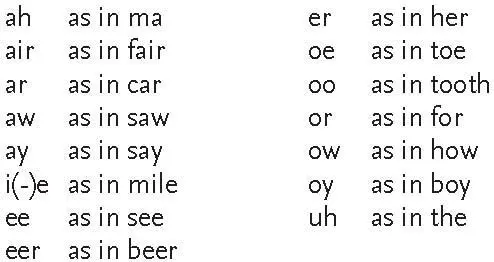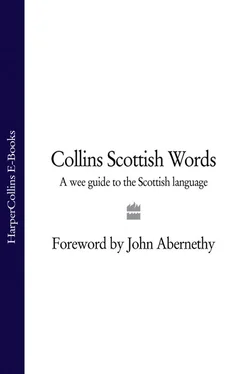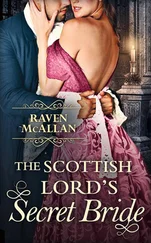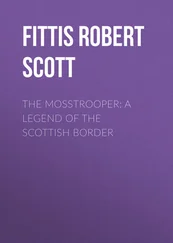Collins Scottish Words
A wee guide to the Scottish language
Foreword by John Abernethy

Cover Page
Title Page Collins Scottish Words A wee guide to the Scottish language Foreword by John Abernethy
Note on the Text Note on the Text The list of words covered in this book is by no means an exhaustive or comprehensive list of all the words used in Scotland or of Scottish origin, but is intended to be an alphabetical compendium of the most interesting ones. In many cases a definitive etymology of the word has been lost in time. Often a word can have more than one meaning and certainly have more than one spelling. The definitions and spellings given in this book are the ones generally considered to be the most likely and commonly accepted. Wherever possible I have mentioned alternative suggestions as to the meanings of words. The subject of Scottish words is as rich and diverse as the people who speak it. It has its linguistic roots in Scotland’s historic languages of Brythonic, Pictish, Gaelic, Norse and English and as with all living and vibrant languages, Scots is continually evolving and not stuck in a past of heritage and nostalgia. I would recommend that anyone who enjoys this book pursues further reading of Scots reference, Scots fiction, Scots poetry and Scots prose to gain an even greater understanding of both the Scots language and the Scottish people themselves.
Editor Editor Mike Munro
Introduction
List of panels
Pronunciation guide
A–Z of Scottish Words
Copyright
About the Publisher
The list of words covered in this book is by no means an exhaustive or comprehensive list of all the words used in Scotland or of Scottish origin, but is intended to be an alphabetical compendium of the most interesting ones.
In many cases a definitive etymology of the word has been lost in time. Often a word can have more than one meaning and certainly have more than one spelling. The definitions and spellings given in this book are the ones generally considered to be the most likely and commonly accepted. Wherever possible I have mentioned alternative suggestions as to the meanings of words.
The subject of Scottish words is as rich and diverse as the people who speak it. It has its linguistic roots in Scotland’s historic languages of Brythonic, Pictish, Gaelic, Norse and English and as with all living and vibrant languages, Scots is continually evolving and not stuck in a past of heritage and nostalgia. I would recommend that anyone who enjoys this book pursues further reading of Scots reference, Scots fiction, Scots poetry and Scots prose to gain an even greater understanding of both the Scots language and the Scottish people themselves.
Mike Munro
Ian Brookes
Helen Hucker
Cormac McKeown
Lucy Cooper
Elaine Higgleton
A few years ago, it was decided by the powers that be that Scotland should market itself as being The Best Small Country in the World. This became the international slogan for Scotland and was used extensively on all promotional material, both at home and abroad. The slogan was deemed to be controversial – why was Scotland limiting itself to being only the Best Small Country in the World, when the title of Best Country in the World had not officially been taken? And furthermore why did Scotland want to be the Best Small Country in the World when there was a perfectly acceptable and common Scots word, ‘wee’, that would have more than sufficed. Why, if it was good enough for Frank Sinatra in the ‘Wee Small Hours of the Morning’ then surely it was good enough for the Scottish tourist industry.
The history of Scotland is truly remarkable for how much influence a small northern region of an island on the outskirts of Europe has had over the world. Scottish first names such as Angus, Donald and Fiona have played guitar with AC/DC, built Trump Towers and married Shrek. Scottish surnames such as MacDonald, Campbell and Stewart have become synonymous with Big Macs, tins of tomato soup and It’s A Wonderful Life. While Scottish place names such as Perth, Hamilton and Houston have become the fourth biggest city in Australia, the capital of Bermuda, and the people you call if you have a problem in space.
As for science and inventions, where would the world be without the steam engine, the television, the telephone, penicillin, colour photography and logarithms – all invented by Scots. What about all the wonderful Scottish writers – John Buchan, Sir Walter Scott, Robert Louis Stevenson and J.M. Barrie, who have given the world The Thirty Nine Steps , Rob Roy , Treasure Island and Peter Pan. And as for December 31st, was it not the Scots who actually invented ‘Hogmanay’ and is it not to the words of ‘Auld Lang Syne’ by Scotland’s national bard, Robert Burns, that millions around the world usher in the New Year? Even though most have no idea what the Scots words mean.
And wherever Scots have travelled to and settled in they have taken the Scots language with them. That wonderful historical amalgam of Pictish, Gaelic, Norse and English that is as Scottish as the land and the people that live there.
So join us on a ‘dander’ from the ‘barry’ denizens of Edinburgh and the ‘gallus’ folk of Glasgow, taking a detour ‘doon-bye’ to the Borders and Dumfries & Galloway and then, ensuring that you have first remembered to take your ‘piece’ with you, ‘gang’ north through the ‘braes’, ‘lochs’ and ‘glens’ of the ‘couthy’ Highlands, where you might spend an evening or two on the ‘randan’ before reaching the ‘rowie’ loving ‘quines’ and ‘loons’ of the North East and beyond to the ‘simmer dim’ of Orkney and Shetland.
On the way you may occasionally become a little ‘crabbit’ and even slightly ‘black-affrontit’ and you may be so ‘scunnered’ by the occasionally ‘dreich’ Scottish weather that you feel like having a ‘greet’, but by the end of the journey if previously you knew ‘hee-haw’ about Scottish words, you might feel slightly ‘wabbit’ from your exertions, but hopefully you will have been ‘awfy’ entertained, and ‘jings, crivvens’ be more conversant in the wonderful and ‘weel-kent’ language that is Scots. So never mind the Best Small Country in the World, be proud to be ‘wee’.
Slainte mhath and lang may yer lum reek
John Abernethy
2009
Where the pronunciation of a word is unusual or of interest, guidance has been provided for the reader. The system used is self-explanatory, as far as possible, but the pronunciation guide below may be used in case of doubt.
Single vowels indicate a short sound. Longer vowels are indicated using the following letter-combinations:

Single consonants have their normal value, with other sounds being indicated by the following letter-combinations:
| CH |
a guttural sound, as in loch |
| ch |
as in chew |
| dh |
a soft sound, as in they |
| sh |
as in show |
| th |
as in thing |
| wh |
an aspirated sound, like ‘hw’ |
Readers should note that the letter ‘r’ is sounded when it follows a vowel in words such as ‘for’, and so the words ‘sore’ and ‘saw’ are pronounced differently in Scots, whereas an English speaker would make them sound the same.
Читать дальше














